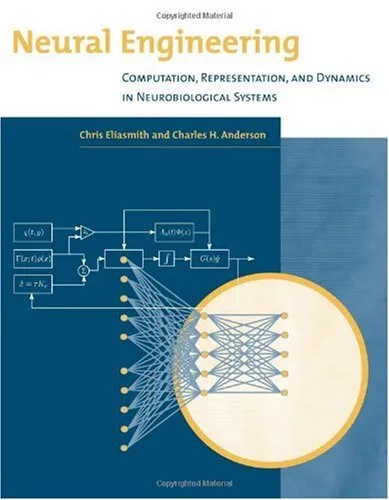Neural engineering: computation, representation, and dynamics in neurobiological systems
4.5
بر اساس نظر کاربران

شما میتونید سوالاتتون در باره کتاب رو از هوش مصنوعیش بعد از ورود بپرسید
هر دانلود یا پرسش از هوش مصنوعی 2 امتیاز لازم دارد، برای بدست آوردن امتیاز رایگان، به صفحه ی راهنمای امتیازات سر بزنید و یک سری کار ارزشمند انجام بدینکتاب های مرتبط:
مقدمه کتاب
کتاب "Neural Engineering: Computation, Representation, and Dynamics in Neurobiological Systems" یک اثر برجسته در زمینه مهندسی عصبی است که تألیف مشترک کریس الیاسمیت و چارلز اچ. اندرسون میباشد. این کتاب به بررسی عمیق محاسبات، نمایش و دینامیک در سیستمهای زیستشناسی عصبی میپردازد و برای کسانی که به درک عملکردهای مغز و توسعه سیستمهای محاسباتی نوین علاقهمند هستند، بسیار ارزشمند است.
خلاصه تفصیلی کتاب
این کتاب به چهار قسمت اصلی تقسیم میشود. در قسمت اول، به بررسی مبانی علمی و فنی مهندسی عصبی پرداخته میشود. مفاهیم پایهای مانند Neural Representation و محاسبات عصبی مورد بحث قرار میگیرند و نویسندگان سعی کردهاند تا این مفاهیم پیچیده را به زبانی ساده و قابل درک ارائه نمایند. قسمت دوم به نظریهها و مدلهای محاسباتی اختصاص دارد، جایی که مدلهای شبکههای عصبی و کاربردهای آنها مورد تحلیل قرار میگیرند.
در بخش سوم، نویسندگان توجه ویژهای به Dynamics یا پویاییهای سیستمهای عصبی دارند. این بخش شامل تجزیه و تحلیل چگونگی تغییرات زمانی اطلاعات در شبکههای عصبی و اثرات این تغییرات بر عملکرد کلی سیستم میباشد. نهایتاً در قسمت چهارم، کاربردهای عملی و پروژههای واقعی در زمینه مهندسی عصبی بررسی میشود. این بخش از کتاب نشان دهنده اهمیت عملی و نوآوریهای موجود در این حوزه میباشد.
نکات کلیدی
- درک عمیقتر از ساختار و عملکرد مغز انسان و سیستمهای عصبی.
- آشنایی با مدلهای محاسباتی و اصول نمایش اطلاعات در شبکههای عصبی.
- اهمیت پویایی اطلاعات و اثرگذاری آن بر پردازشهای شناختی.
- آشنایی با کاربردهای عملی مهندسی عصبی در پزشکی و فناوریهای نوین.
نقلقولهای معروف از کتاب
"The interplay between computation and dynamics is crucial in understanding neural systems."
"To mimic the brain, one must understand both the hardware and the software it employs."
چرا این کتاب مهم است
اهمیت این کتاب در آن است که بهصورت جامعی به بررسی مفاهیم پیشرفته در مهندسی عصبی میپردازد و پلی میان تئوری و عمل ایجاد میکند. با توجه به پیشرفتهای سریع در زمینه هوش مصنوعی و محاسبات عصبی، این کتاب به عنوان یک مرجع ارزشمند برای دانشجویان، پژوهشگران و متخصصانی که به طراحی سیستمهای نوین هوش مصنوعی و شناخت مغز علاقهمند هستند، میتواند بسیار مفید باشد.
علاوه بر این، "Neural Engineering" به خوبی توانسته است که اصول علمی و تکنیکی را به روشی که برای غیرمتخصصان نیز قابل درک باشد، ارائه دهد. این ویژگی کتاب را به یک منبع آموزشی عالی برای ارتقای آگاهی عمومی در زمینه علوم عصبی تبدیل کرده است.
Introduction to "Neural Engineering: Computation, Representation, and Dynamics in Neurobiological Systems"
Embarking on a journey through the fascinating world of neural engineering, this book offers an in-depth exploration of computation, representation, and dynamics in neurobiological systems. Authored by Chris Eliasmith and C. H. Anderson, the text delves into understanding the intersection of neuroscience and engineering, organically intertwining theory with practical applications to address complex questions about the brain.
Summary of the Book
The book, "Neural Engineering," presents a comprehensive framework for understanding how the brain computes, represents, and processes information. Through the lens of neuroscience and engineering, it seeks to address how neurons can be used to build brain-like systems capable of executing various cognitive functions. Starting with foundational concepts in neuroscience, it transitions into discussions about computational models and neural dynamics, systematically constructing a framework that bridges biological systems and artificial constructs.
The authors elaborate on methods for modeling neural systems using engineering principles, employing mathematical tools to simulate brain functions and incorporating neural coding as a pivotal concept in understanding information processing. By elucidating principles like spiking neurons and population coding, the text offers avenues for conceptualizing how complex behaviors arise from neuronal ensembles.
Key Takeaways
- Understanding the basic principles of neural computation and representation provides insights into functioning brain models, potentially influencing AI development.
- The book emphasizes the design and use of neural models informed by biological plausibility and mathematical rigor.
- It covers concepts like neural coding, spiking neurons, and network dynamics with clear explanations and supportive examples, making it relevant for both students and professionals in neuroscience and neural engineering.
- Neurobiological systems can be comprehended better through interdisciplinary approaches, combining aspects of biology with computational technology.
Famous Quotes from the Book
"In neural engineering, discerning the bridge between biology and computation is crucial for unraveling the intricacies of the mind."
"Neurons are not merely the messengers of the brain, but its architects, shaping perception and action through complex biological design."
Why This Book Matters
This book is seminal in its approach to blending neuroscience with engineering principles, making it indispensable in the evolving field of neural engineering. By demystifying the core processes of neural computation and the principles underlying biological systems, it becomes an essential resource for understanding how technological innovations can be inspired by and integrated into biological frameworks. The ideas presented in this text have far-reaching implications not only for advancing biomedical research and neuroprosthetics but also for influencing the development of artificial intelligence systems that mimic human cognition.
For students, researchers, and practitioners keen on exploring the convergence of biological intelligence and computational systems, this book lays down a robust foundation and encourages further exploration into the dynamic world of neurobiology and engineering.
دانلود رایگان مستقیم
شما میتونید سوالاتتون در باره کتاب رو از هوش مصنوعیش بعد از ورود بپرسید
دسترسی به کتابها از طریق پلتفرمهای قانونی و کتابخانههای عمومی نه تنها از حقوق نویسندگان و ناشران حمایت میکند، بلکه به پایداری فرهنگ کتابخوانی نیز کمک میرساند. پیش از دانلود، لحظهای به بررسی این گزینهها فکر کنید.
این کتاب رو در پلتفرم های دیگه ببینید
WorldCat به شما کمک میکنه تا کتاب ها رو در کتابخانه های سراسر دنیا پیدا کنید
امتیازها، نظرات تخصصی و صحبت ها درباره کتاب را در Goodreads ببینید
کتابهای کمیاب یا دست دوم را در AbeBooks پیدا کنید و بخرید
1239
بازدید4.5
امتیاز0
نظر98%
رضایتنظرات:
4.5
بر اساس 0 نظر کاربران
Questions & Answers
Ask questions about this book or help others by answering
No questions yet. Be the first to ask!














